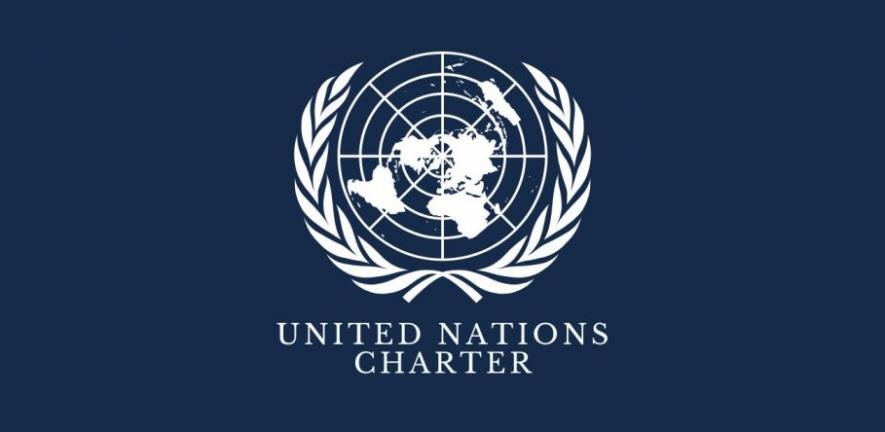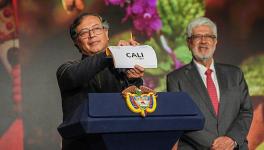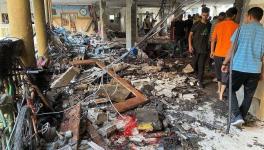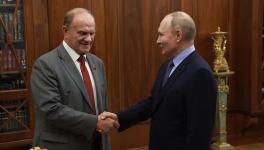The UN Charter is Outdated and Unfit for Purpose

From signing the Peace of Westphalia in 1648 to the United Nations (UN) Charter in 1945, the world has come a long way in its struggle to establish an organisation subordinated to no Earthly authority that upholds dignity and keeps a check on the untrampled exercise of sovereign power over territories.
It was tasked with promoting and upholding peace, security and democratic values around the world. No doubt, that is a lofty task for any organisation to undertake and every organisation falls short of the aims it sets out to achieve which is why the bars are set that high.
But there has been no real attempt by the UN to ever achieve these ideals. It was bound to fail from its very inception as the ideals and the articles have always been in direct conflict with each other.
The UN was bound to fail from its very inception as the ideals and the articles have always been in direct conflict with each other.
The structural imbalance between ideals and the mechanisms of power within the UN has never been more evident than in the context of the ongoing crisis in Gaza. This crisis highlights the fundamental issue: an institution designed to protect peace often finds its hands tied, not because of practical obstacles, but due to an inherent imbalance in its framework.
The preamble to the UN Charter opens with “We the people” and is based on the Westphalian principle that all States are equal in international law. It calls for equal representation of all people through States and is open to membership for all States that accept the obligations contained in the charter. But as Salil Shetty has asked, “Where are the voices of the people in the decision-making?
Article 2 of the charter says that the “organisation is based on the principle of sovereign equality of all its members”, which again shows the commitment of the UN to the idea of democracy. However, the veto power accredited to the permanent five members of the Security Council is a manifest breach of democratic values.
This imbalance in power not only shows that not all UN members have the same say but also has been the prime reason for inaction by the UN in critical situations of war and crimes against humanity.
The permanent five invoke veto power blatantly to protect themselves even when they are the aggressors and responsible for violations of human rights. Democracy without accountability is a sham and, as Thomas Paine warned us, “A body of men holding themselves accountable to nobody ought not to be trusted by anybody.”
In addition to this, neither China nor Russia are democracies, to begin with, yet both of them have been empowered to enforce democratic values on the world. These countries’ claim to power is also called into question as neither were part of the original permanent members of the Security Council.
Both Russia and China’s claim to permanent membership is based on successorship which goes against republican values. One is forced to recall the Orwellian idea, “All animals are equal, but some animals are more equal than others.”
Since the UN’s founding in 1945, the charter has been amended just three times in 1963, 1965 and 1973. That is not to say that changes to the charter have not been made outside the amendments. Most of the reforms to the UN have had to be introduced without a formal amendment because of the abuse of veto power by the permanent five members. There have been several proposals to reform the veto powers over the years, but all are fraught with challenges.
One of the earliest and most ambitious proposals has been to abolish the veto power altogether. The veto mechanism has been controversial since its inception, with numerous calls for its removal.
However, any attempt to formally amend the charter in this regard would inevitably face the hurdle of being vetoed by the permanent five themselves, preserving their own privileges. In late October 2022, Russian President Vladimir Putin rejected the idea put forward by Turkish President Recep Tayyip Erdoğan to remove the veto power.
Another proposed approach is the ‘Responsibility not to Veto’ (RN2V). The initiative, proposed in 2001 for the first time, provided that the five permanent members should not exercise their veto in cases where their own interest is not involved or in cases where there is an otherwise majority support.
While over the years the idea of RN2V has gained more and more support, the permanent five members of the Security Council, with the exception of France, have not shown any inclination towards the idea. In such a situation, any expectation of a modus vivendi between the permanent five is only wishful thinking.
The veto power accredited to the permanent five members of the Security Council is a manifest breach of democratic values.
In addition to addressing veto reform, there have been calls to expand the membership of the Security Council to better reflect the shifting global political and economic landscape. Proposals to include the G4 nations (India, Germany, Japan and Brazil) as new permanent members are based on the premise that the current distribution of power no longer accurately represents the world order established in 1945.
However, “if the council cannot reconcile the interests of its five permanent members, how will it cope with the interests of a bigger membership?” is a very pertinent question raised by many countries.
Alternative suggestions aim to limit the scope of veto power without abolishing it entirely. Keith L. Sellen suggests replacing the veto with a “double majority” which would require agreement by eight members, including at least three permanent members.
Michael J. Kelly suggests the promulgation of a special session of the General Assembly if a matter is vetoed by one of the five permanent members. If the proposal receives majority votes in the General Assembly, then the veto can be overridden. Since both these proposals require the assent of the permanent five and would lead to interference in their privileges, they are likely to be vetoed.
Given the difficulty of amending the charter, some scholars have looked to the development of customary international law as a more feasible path for reform. Some academics agree that the “responsibility to protect” principle has already acquired the element of opinio juris sive necessitatis.
From Kosovo to Iraq, there is ample precedent of States overriding the veto in response to gross human rights violations. Handayani and Poerana have explained the development of the R2P principle through the Grotian moment notion and have argued that “due to R2P’s nature new rules of custom emerge with unusual rapidity and acceptance”.
This suggests that even if formal amendments remain blocked, the international community may still find ways to work around the veto through evolving norms and practices.
The permanent five invoke veto power blatantly to protect themselves even when they are the aggressors and responsible for violations of human rights.
The veto powers are the UN’s Faustian bargain, a bribe handed to the permanent members to ensure their allegiance and keep the institution relevant. But this compromise has made the UN hostage to their whims, and any real attempt to strip away this privilege would shatter the fragile illusion of unity, spelling the organisation’s downfall.
The enduring presence of veto power, monopolised by a select few nations, undermines the fundamental principle of sovereignty and democracy that the organisation purports to uphold. As global conflicts and humanitarian crises continue to unfold, the UN’s ability to act decisively is increasingly questioned.
The reality is that without substantial restructuring, the UN risks becoming a relic of a bygone era. An organisation born from the ashes of a genocide now appears to be facing its reckoning at the hands of a genocide perpetrated by the very State it once sought to protect.
Developing new norms, such as the responsibility to protect (R2P), offers a glimmer of hope, but without the political will to confront the power imbalances at the core of the organisation, these measures may remain insufficient.
From Kosovo to Iraq, there is ample precedent of States overriding the veto in response to gross human rights violations.
True reform will require an unprecedented level of compromise from the permanent five members and restructuring. Until then, the UN remains caught in a paradox, a global body designed to enforce peace and justice but, in practice, constrained by the very structures that enable the perpetuation of conflict and inequality.
A Delhi-based lawyer, practising in the office of Harin P. Raval, passionate about human rights, who finds solace and inspiration in the beauty of poetry.
Get the latest reports & analysis with people's perspective on Protests, movements & deep analytical videos, discussions of the current affairs in your Telegram app. Subscribe to NewsClick's Telegram channel & get Real-Time updates on stories, as they get published on our website.
























